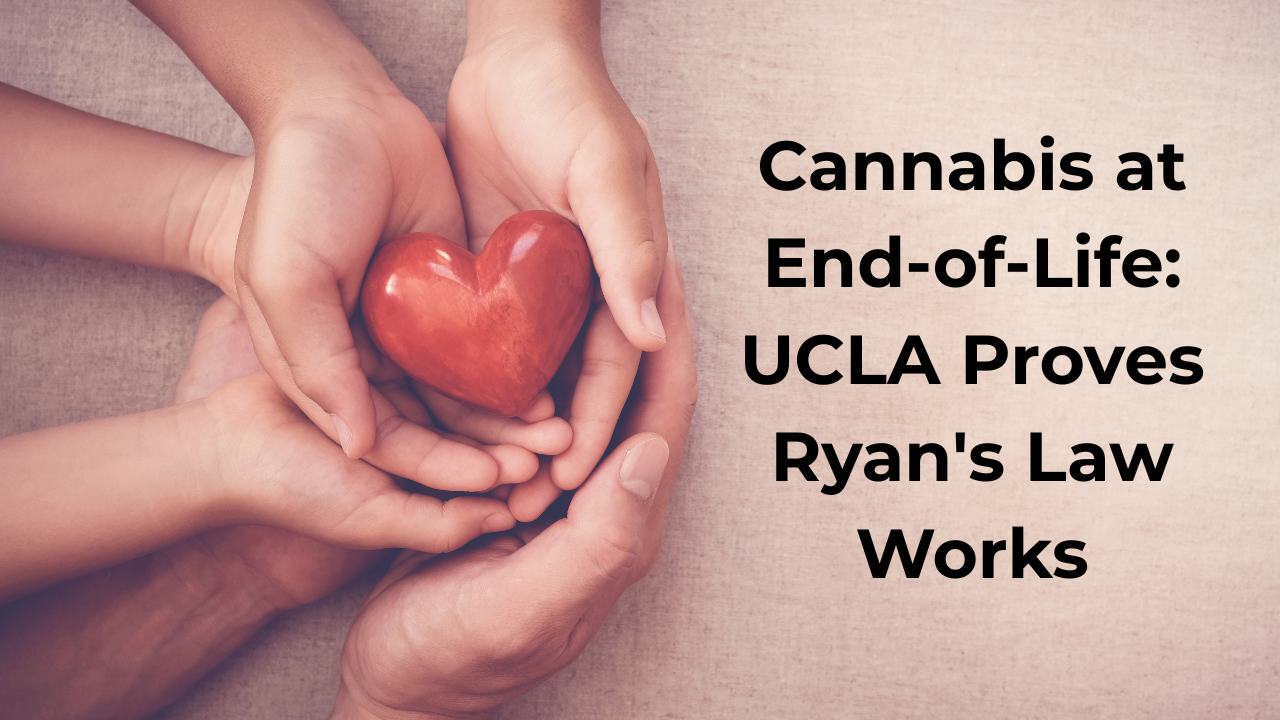Cannabis at End-of-Life: UCLA Proves Ryan's Law Works
Jul 03, 2025
By Debi Wimberley, Founder of the Effective Cannabis Newsletter and Cannabis Specialist
The Choice No Family Should Have to Make
Imagine being told your loved one has only weeks to live, and you must choose between pain relief or consciousness. This was the heartbreaking reality that Ryan Bartell and his family faced in March 2018. A compassionate special education teacher working with autistic children, Ryan was diagnosed at 32 with stage 4 pancreatic cancer.
When the first hospital refused to allow him access to Medical Cannabis, Ryan’s preferred method for managing pain while staying alert, his father knew he had to advocate for his son.
They transferred Ryan to another facility where he could use Cannabis for his final weeks. Instead of being heavily sedated, Ryan spent his last two and a half weeks lucid and pain-free, having meaningful conversations with his family and laughing with friends who came to visit.
Ryan's father made a promise that day: no other family would face this impossible choice.
Ryan's Law: Honoring the Patient's Need with Dignity
That promise became Ryan's Law with California legislation requiring healthcare facilities to allow terminally ill patients to use their own Medical Cannabis. The law ensures that patients with a prognosis of one year or less can access Cannabis with a valid medical card or physician recommendation. Read the complete Ryan's Law here.
But here's the question everyone asked: Would hospitals actually embrace this? Would it really work in practice?
UCLA Steps Up: Turning Law into Life-Changing Reality
When Ryan's Law took effect in January 2022, UCLA's Santa Monica Medical Center didn't just comply; they became pioneers. Their cancer care team asked themselves: How can we honor Ryan's memory and give our patients the same choice he fought for?
The answer was revolutionary in its simplicity: treat Cannabis like any other medication that helps patients live their final days with dignity.
The Results That Speak Louder Than Words
From May 2022 to June 2024, UCLA's oncology unit welcomed 8 patients who chose Cannabis for their end-of-life care. The results were:
- Zero safety problems were reported.
- Nurses felt comfortable helping patients access their Cannabis and empowered patients' autonomy.
- Patients found relief from pain, anxiety, and sleeplessness.
- Families got their loved ones back, alert, present, and able to create precious final memories.
But the real success wasn't in the numbers. It was in the moments that mattered most.
What This Really Means: Consciousness Over Sedation
For patients, Medical Cannabis offered something traditional pain medications couldn't: the ability to be fully present during their final chapter. No heavy sedation. No clouded thinking. Just relief that allowed them to remain themselves.
For families, this meant conscious final conversations instead of bedside vigils with unconscious loved ones. It meant laughter, stories, and the ability to say everything that needed to be said.
For healthcare providers, it meant honoring what patients truly wanted: dignity and choice in their most vulnerable moments.
The Ripple Effect: From One Hospital to a Movement
"Every terminally ill patient should be able to have the same opportunity as Ryan; to spend their final days with as much quality and dignity as possible. They are dying… why wouldn't we want that for them?" - Jim Bartell, Ryan's father and founder of Ryan’s Law Foundation.
UCLA proved that Ryan's vision works. Their success is inspiring healthcare systems across California and providing a blueprint for hospitals nationwide. However, Ryan's Law currently exists only in California.
That means millions of families in other states still face the same impossible choice Ryan's family initially confronted.
Why This Matters to You—Right Now
This isn't someone else's problem. Every single one of us will either face a terminal diagnosis ourselves or watch someone we love receive one. Cancer, heart disease, and countless other illnesses don't discriminate.
How long will it take to provide compassionate, patient-centered end-of-life care?
Don't wait until you're sitting in a sterile hospital room, holding the hand of someone you love more than life itself, wishing they could be alert enough for one last meaningful conversation. That moment is for love, not for fighting healthcare policies.
Your Action Steps: Building on UCLA's Success
No matter your role, you can help work towards this life-changing option:
- If you're in California: Know that Ryan's Law protects your access to Medical Cannabis in healthcare facilities. Share UCLA's success story to show others that this works.
- If you're anywhere else: Use UCLA's example when advocating for similar laws in your state. Contact your legislators and tell them about Ryan's story and UCLA's proven results.
- Healthcare providers: Share this success story with colleagues and administrators. If you work in California, learn about implementing Ryan's Law in your facility.
- Everyone: Start conversations about end-of-life dignity. Share this article. Support the Ryan's Law Foundation working to expand this nationwide.
The Choice That Changes Everything
Ryan's Law isn't just about Cannabis. It's about preserving the sacred moments left between terminal patients and their loved ones. It's about honoring what patients actually want in their final chapter. It's about ensuring that no family has to choose between pain relief and consciousness.
"The happiest moments in my life were the first time I held each of my three children when they were born. The saddest moment in my life was holding Ryan's hand as he took his last breath. My hope is that my saddest moment will be made less painful by ensuring that Ryan's Law will allow thousands of other terminally ill patients to live their final days with the quality and dignity that he was able to experience." - Jim Bartell.
The Time Is Now To Make A Difference
Every day we wait, families lose irreplaceable final moments together. Every month without Ryan's Law in your state means patients are forced into unconsciousness when they could be creating lasting memories with loved ones.
UCLA showed us it's possible. Ryan showed us it's necessary.
Now it's up to all of us to make sure every patient gets the choice Ryan finally received.
When healthcare gets it right, families say goodbye with love instead of sedation, consciousness instead of confusion, and dignity instead of desperation.
This is not just an inspiring California success story. It's a blueprint for transforming dignified end-of-life care globally.
Key Resources and References:
1. Ryan's Law Full Text: California SB-311.
2. UCLA Implementation Study: McKaig, A., et al. (2025). Implementing Ryan's Law on an Inpatient Medical Oncology Unit. Clinical Journal of Oncology Nursing, 29(1), 86-90. Implementing Ryan’s Law on an Inpatient Medical Oncology Unit - PMC
3. Patient Resources: Americans for Safe Access - Ryan's Law Guide
4. Healthcare Provider Resources: Cannabis Nurses Network
5. Advocacy Support: Ryan's Law Foundation
6. Professional Education: USC Mann School Continuing Education on Ryan's Law
About Debi Wimberley:
Debi Wimberley is a resilient advocate for Medical Cannabis education and self-empowered health. A survivor of decades of chronic pain and lung disease, she turned her background in medical technology, oncology, and hospital systems into tools for thriving. Certified in Medical Cannabis applications and Patient Care, Debi is a professional communicator, podcaster, TEDx speaker, and author. Founder of Effective Cannabis and Effective Cannabis Newsletter. Her mission is to centralize quality, accurate, fact-based education through collaborative work with other certified Cannabis educators, health coaches, and professionals.
Click the Learn More Button
Effective Cannabis Newsletter is a platform to educate on the vital role of the Endocannabinoid System (ECS) in one's health. The information is not intended or implied to be a substitute for professional medical advice, diagnosis, or treatment. All content, including text, graphics, images, and information, contained in or available through this newsletter is for general information purposes only. It is not medical advice; it is health awareness.
Were you moved or inspired by a piece of content?
Do you have a suggestion or question for us?
Do you have a powerful story about your health and Cannabis?
Click the button and let us know!




